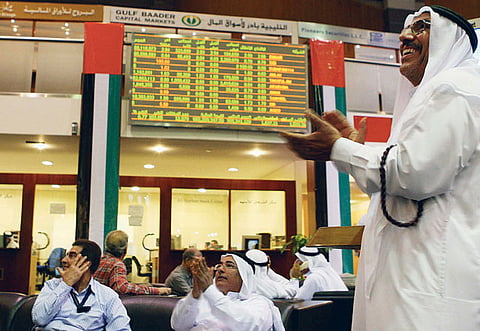Foreign investors set sights on UAE
Interest is strong even though the index is yet to match levels seen in pre-upgrade period

Dubai: Foreign institutional investors on the UAE bourses have made a beeline ever since the UAE index was upgraded to emerging market from a frontier one.
Net investment flow from foreign investors during 2014 reached Dh4 billion, when UAE markets were upgraded to emerging market status by the MSCI, the global index provider. This compares with Dh1.7 billion worth of net investment in 2013.
Foreign institutional investors on the Abu Dhabi Securities Exchange more than doubled to 791 in September 2014 over the previous year, and analysts feel that this has resulted in the bourse getting more stable money.
“There is a genuine international focus on what we do in the region. There is a better understanding that the Saudi, UAE and Qatar markets are becoming and would become more institutionalised over time. The benefits are also in operating in higher standards than previously used to be the case,” Saleem Khokhar, head of equities at National Bank of Abu Dhabi’s asset management group told Gulf News.
“We are seeing more positive steps. We have also seen index balance going up but the real kicker would come in when Saudi Arabia is formally inducted,” Khokhar said.
MSCI, which has a stand-alone index on Saudi markets, hopes to include the Gulf’s biggest equity market in 2017.
Milestone
The MSCI upgrade has proved to be another big milestone for the exchange, which enabled institutional investors to play in the market ensuring liquidity, Essa Kazim, the chairman of the Dubai Financial Market, said in an interview to Gulf News in March.
“After the MSCI upgrade," said Kazim, "we gave managed to attract different pool of liquidity, especially the index trackers. Today they are forced to have positions to just reflect the index.
"This is an opportunity for us to work on as a developed market as majority of criteria from system, operations, efficiency, risk and capability point of view so I think it’s just a matter of time,” Kazim added.
However, the DFM wants to get more institutional investors on board, even as the challenge for the exchange is to get more companies into initial public offerings.
“Some of the of the companies we have talked to is out of the concern of keeping the assets unaffected under the umbrella of an institutional set-up. Majority of the family owned businesses are very successful ... I don’t think they would come to the market [out of a] need for financing requirements,” he said.
Continuity
“Certain companies would have wished to have been public when they faced some challenges during the global financial crisis. If they were listed they could had tapped different means of financing. Rather than be dependent on banks, they could have issued sukuks, debt instruments or invited a strategic partner etc. The incentive for them would be the matter of continuity and sustainability, which is critical,” he added.
The bourse also wants to get more companies from tourism, retail, health, education, logistics and transportation sectors to be presented on the DFM to represent the real economy.
Currently, the capital markets have mostly companies in real estate, banks and financial institutions, which contribute to only 35 per cent of Dubai’s GDP.
“What is needed is more diversity in investments that we can invest into, as the index has been dominated by a couple of sectors. We would like to see more depth and breadth to the markets. As a sophisticated investor, one needs to have an access to derivatives etc.”
The DFM chairman said they plan to soon start derivative contracts at Nasdaq Dubai.
Sign up for the Daily Briefing
Get the latest news and updates straight to your inbox


